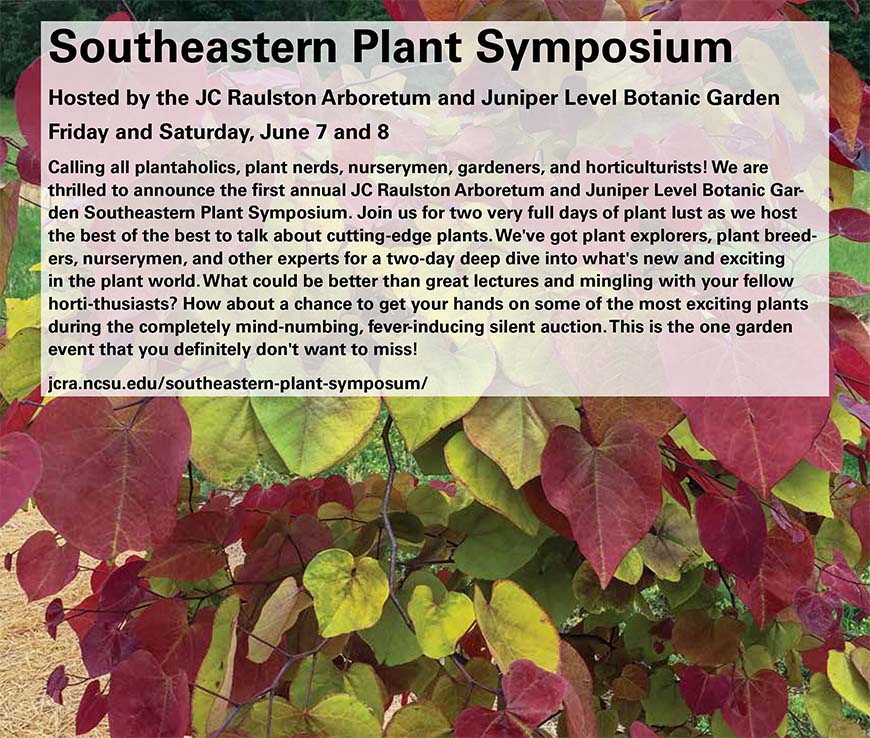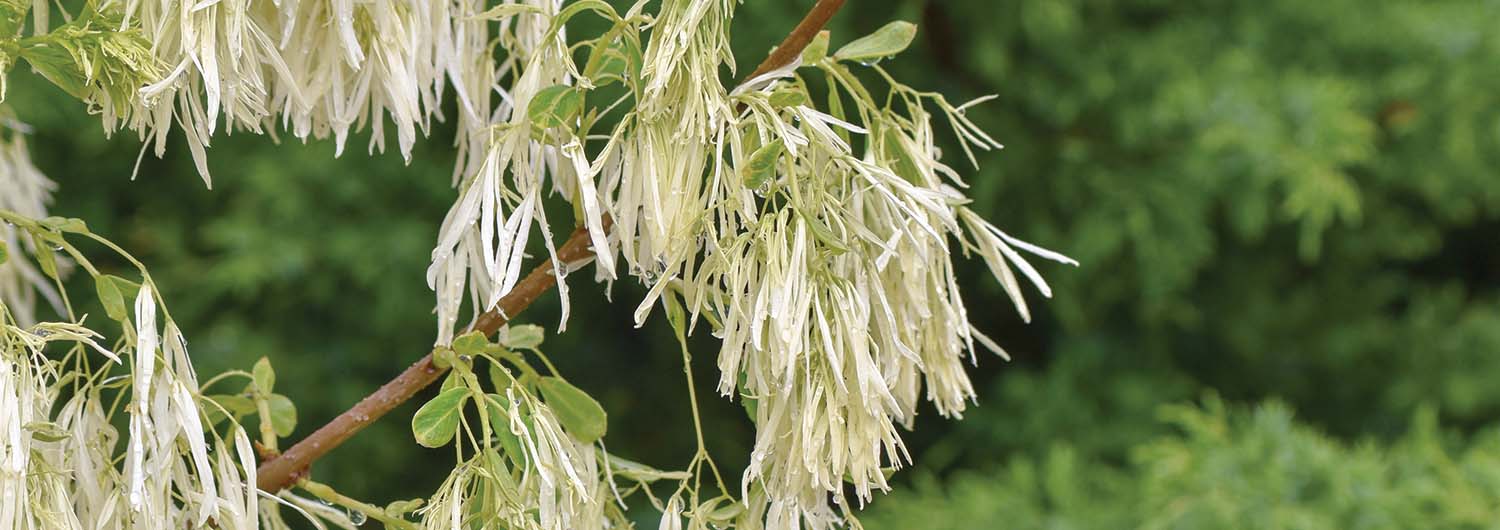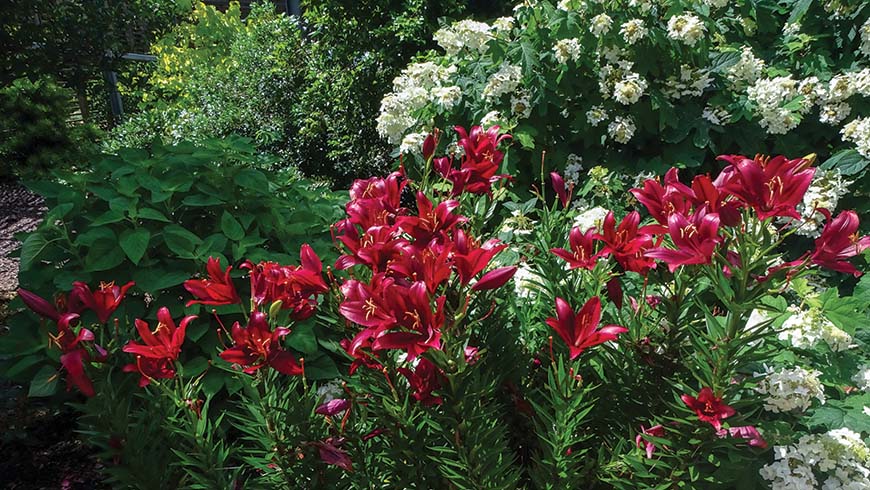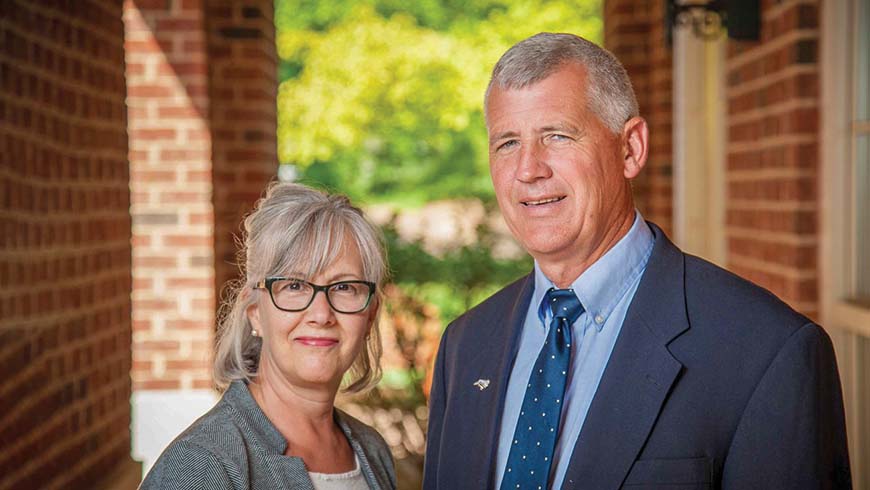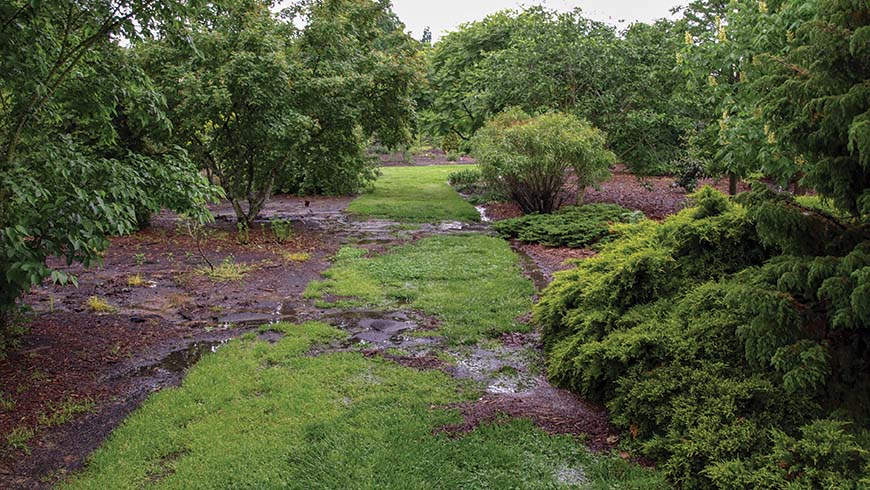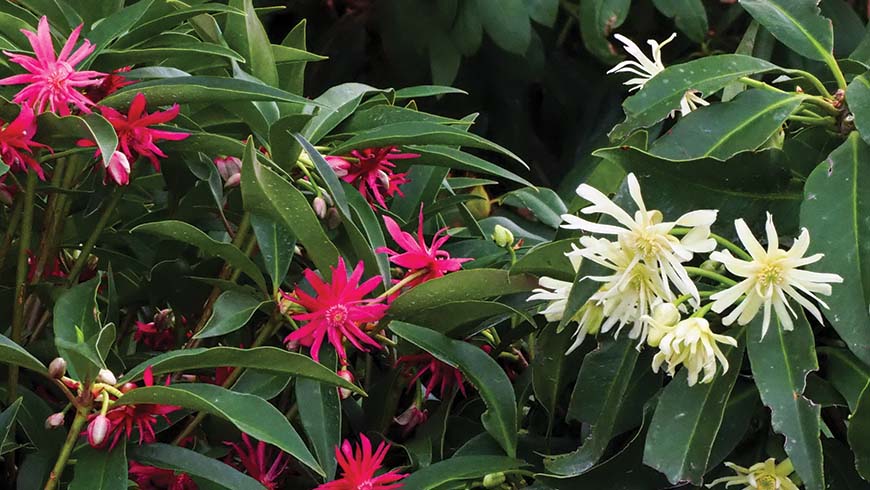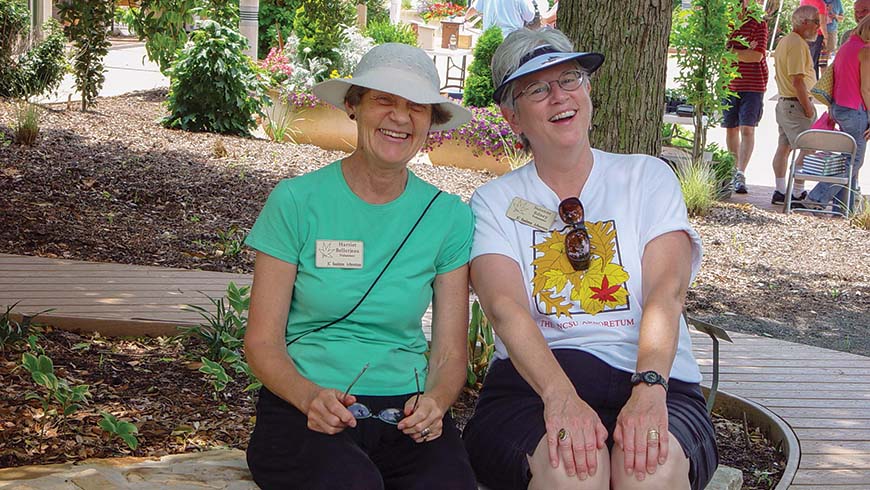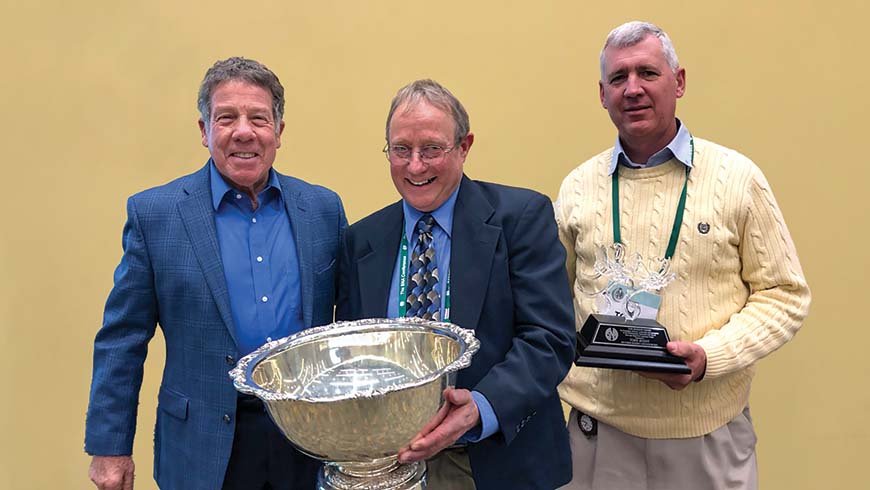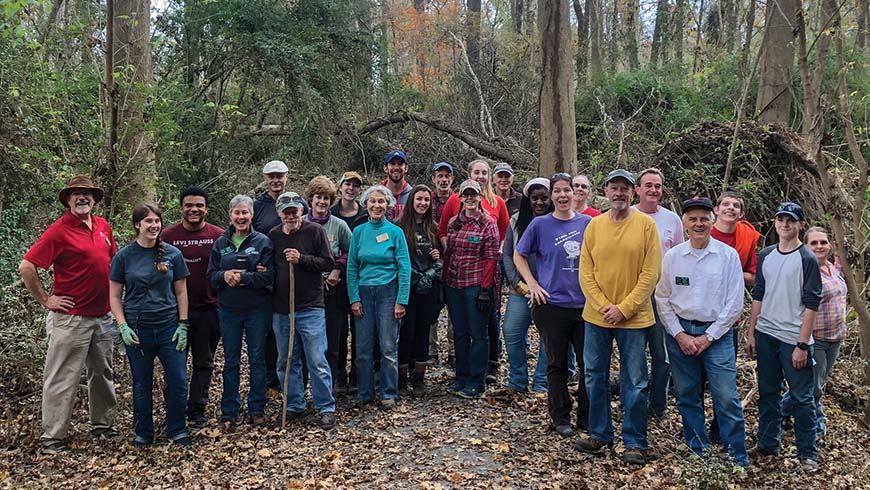Friends of the JC Raulston Arboretum Newsletter
Spring 2019 – Vol. 22, No. 1
Director's Letter
Greetings from the JC Raulston Arboretum
By Mark Weathington, Director
We've got exciting news to kick off 2019: the JC Raulston Arboretum and Juniper Level Botanic Garden (Tony Avent's garden surrounding Plant Delights Nursery) are formalizing their long-time collaborative status and joining forces. Tony and Anita Avent are gifting their property to the JC Raulston Arboretum and NC State University to continue the legacy of bridging the gap between botany and horticulture. Check out page three for more information about this game-changing partnership.
One of the first, concrete examples of the JCRA/JLBG partnership is the kickoff of the first annual Southeastern Plant Symposium, catering to plant nerds from across the region and beyond. We are bringing in some of the best of the best to talk about cutting edge horticulture. We have plant explorers, plant breeders, nurserymen, and other experts for a two-day, plantaholic binge. This will also be a great opportunity to get your hands on some really rare, new, and very choice plants. We expect a full house for this one, so register early.
The partnership with Juniper Level Botanic Garden is just one of the many, many collaborations the JCRA cultivates. We co-host lecture series with the Piedmont Chapter of the North American Rock Garden Society as well as the Wake County Extension Master Gardener Volunteers, we have arrangements with dozens of local businesses for benefits for our members, we partner with the American Horticultural Society for reciprocal admissions with 100s of other gardens, and the list goes on and on. The key to these partnerships is looking for ways to further our mission and reach while helping our partners to also be successful.
We don't just partner with other organizations, we consider all our members, volunteers, and donors to be a part of our team. We hope the JCRA provides you with what you are looking for, whether that is meaningful educational programming, a beautiful and peaceful space, access and introduction to new plants, or a place for camaraderie and friendship. Each and every one of you, in big ways and small, help move us forward in our mission to connect people with plants.
Annual Report
2018 JC Raulston Arboretum Annual Report
There are many people to thank for their support in 2018. In an effort to conserve resources, the full 2018 annual report is offered on the JCRA Web site at https://jcra.ncsu.edu/publications/annual-reports/ instead of printed copies. A few highlights of our record-setting year (all-time membership count, Moonlight in the Garden selling out, etc.) are included below.

Arboretum Update
JC Raulston Arboretum × Juniper Level Botanic Garden—The Newest Garden Hybrid
By Mark Weathington, Director
It's not every day that you get to participate in a piece of history, but back in 2016 when Tony and Anita Avent first broached the topic of combining the horticultural forces of Juniper Level Botanic Garden with the JC Raulston Arboretum, I knew I was experiencing an important moment. Juniper Level Botanic Garden is Tony's life's work. Inspired by J. C. Raulston himself, Tony built one of the best collections of plants in the world, developed a sophisticated breeding and research program, and inspired tens of thousands of gardeners through his deep knowledge and irreverent humor.
Tony shares J. C.'s passion for plants and their importance to our world. He built the stunning Juniper Level Botanic Garden—one of the most unique in the world—and the award-winning Plant Delights Nursery on a 28-acre site just south of Raleigh. Throughout JLBG's development, the garden has paralleled the JCRA, and both gardens freely share plants and ideas with each other—an informal collaboration spanning the past 30 years.
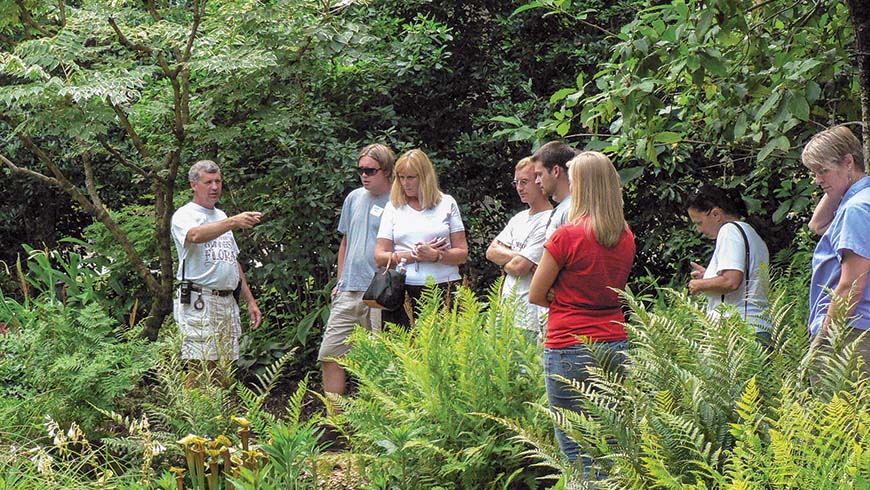
What does this mean for the JCRA and JLBG? We will spend the next several years forging even closer relationships and crossovers between our institutions. In 2019, JLBG will join with the JCRA's established Index Seminum or seed list program. This program sends seed out to botanical institutions and researchers around the world and is part of a network of like-minded gardens from Volgograd, Russia to Taipei, Taiwan. Another exciting development is our first annual joint Southeastern Plant Symposium, June 7–8. This plant-centric extravaganza will feature some of the best and brightest including John Grimshaw of the United Kingdom's Yorkshire Arboretum, David Creech, Tom Ranney, Ted Stephens, Buddy Lee, and many more.
What does this mean for Plant Delights Nursery? Nothing for the time being. While we help raise money for an endowment to continue operations of JLBG without funding from the nursery, PDN will continue to operate as normal. As for the garden's management, Tony will continue to operate it as he has since its inception. The management of JLBG won't fall under the direction of the JCRA until Tony decides he's had enough gardening and takes up a new hobby—in other words, a very long time from now.
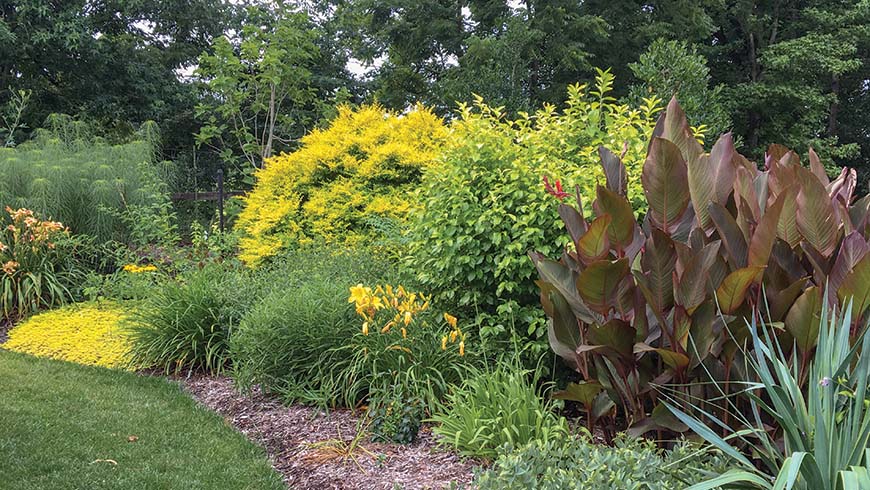
How will this merger affect the JCRA in the short and long term? In the short term, Tony's network of 30,000+ catalog subscribers (catalog still available for only "10 stamps or a box of chocolates" despite inflation), and numerous contacts across the country and around the world will extend the reach of the JCRA. The focus and mission of the JCRA will not change, but opportunities will be increased as we reach new audiences and meet new supporters. In the long run, the JC Raulston Arboretum will not only gain land and research space, but will also gain access to the resources and educational opportunities provided by JLBG. Additionally, the two gardens together will have a combined collection of more than 32,000 herbaceous and woody plants—one of the world's greatest collections of plant genetics.
We have operated as sister institutions offering mutual support and sharing our collections for decades. The JC Raulston Arboretum and Juniper Level Botanic Garden merger will ensure our mutual goals of botanical study, practical research, genetic conservation, and plant distribution continue long beyond our time and will be an enduring force in a changing world.
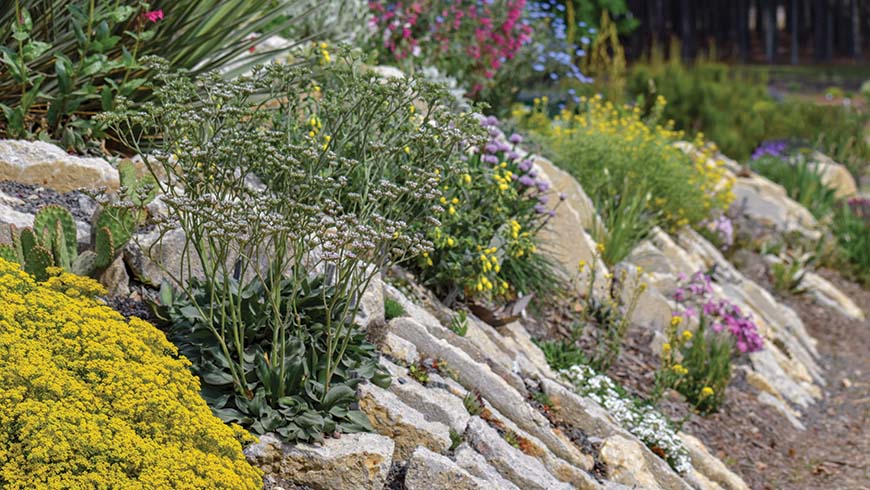
You can support the JLBG fund-raising effort by contacting our director of development, Alycia Thornton. She can be reached by phone at (919) 513-7068 and by e-mail at alycia_thornton@ncsu.edu.
Contributions to support JLBG should be directed to the Endowment Fund of NC State University, Campus Box 7645, Raleigh, NC 27695-7645. Please write JLBG Endowment in the check memo line.
Island Hopping in the Galápagos
January 18–29, 2020
Join the JCRA as we explore exotic Ecuador from the capital city Quito to the tropical rainforest and out to the Galápagos Islands January 18–29, 2020. We'll start our trip in the world cultural heritage city Quito, known as the city of eternal spring, before heading down to the tropics. A canoe will be waiting to transport us up river to our amazing tropical lodge where we will enjoy the plants and wildlife with a master naturalist as well as getting a chance to see how the locals live.
After a couple of days in the tropics, we head back to Quito with a stop in the cloud forest of the Andes. Then it is off to the Galápagos Islands where we will have five days to explore a variety of islands, snorkel with sea lions, and watch the blue-footed boobies and Darwin's famed finches from the comfort of a luxury resort, which serves as our home base.
Whether you are an avid plant lover, dedicated birder, or just someone who wants to travel with a fun group of new friends, this is the trip of a lifetime.
Horticulture
More Change, Less Mud
By Douglas Ruhren, Gardens Manager
There's no time for horticulture staff to rest on our Laurus nobilis, especially when the Laurus is in part of the JC Raulston Arboretum slated for major renovation. That part being the northeast corner, bordered by Beryl Road and Brickhaven, the building beyond the east border. The three main issues are dealing with runoff, developing paths that are passable in all weather, and renovating the plant collection. Heavy-duty brainstorming is currently underway between Arboretum staff and its planning committee volunteers.
Responsible landowners do what is possible to capture runoff and keep it onsite. Currently, excess rainfall accumulates as it travels to this low point, first pooling, and then with adequate volume, leaving the Arboretum, traveling across the public sidewalk spilling onto Beryl Road and in short order into a storm drain. It does not affect Beryl Road to a significant degree and though its impact is unknown upon entering the storm drain, it is likely that it adds to the burden of runoff as it makes it way to the sea.
So, step one is to determine how best to capture this runoff. Perhaps it will be a pond or some version of a rain garden. Its location and size will determine other aspects of this renovation. Perhaps we will consult engineers. It must function as needed. Aesthetics, though very important, are secondary.
Once this first issue is settled, decisions can be made on a path system. Much of this area is too wet to traverse after a heavy rain, let alone bring in a garden vehicle; vehicles essential for hauling out debris or hauling in mulch. Creating all-weather paths is imperative. Yet it must be added that the JCRA is not necessarily trying to create Garden-of-Eden conditions of "evenly moist well-drained soils." This part of the Arboretum can be wet. We garden in the real world. You garden in the real world. In the real world, we often have wet-sites to deal with. There are plants that thrive in wet-sites. Why not exhibit such wet-site tolerant plants? Why not trial plants to determine if they are wet-site tolerant? However, the paths must allow passage through these areas even in a wet spell, so visitors can visit, and Arboretum staff and volunteers can work.
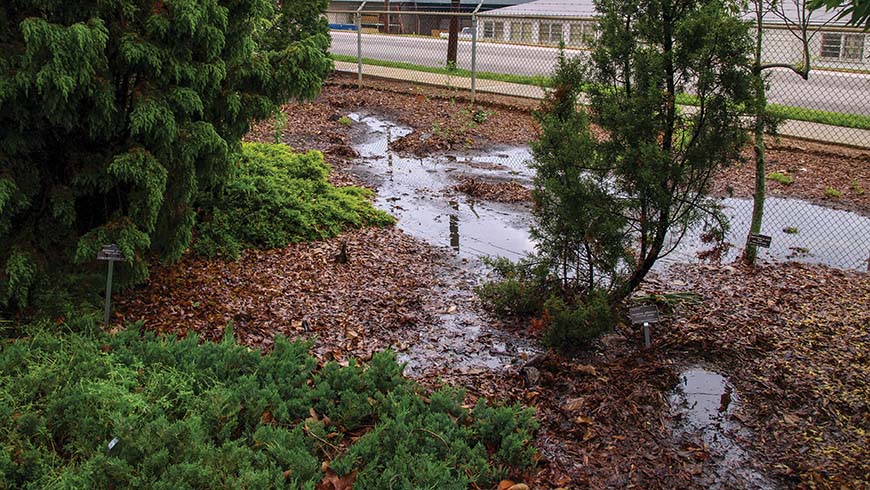
The third part of this renovation is the plants. Each and every plant will be individually evaluated. Remember that the first and foremost mission of the JCRA is to evaluate plants to determine if they are worthwhile ornamentals and are suitable to the growing conditions of the Southeast. The JCRA has never been meant to be a permanent repository of a plant collection. Yet, in this northeast corner, it is almost as if it has become exactly that. Many plants have been in this area for over 30 years, perhaps even approaching four decades. It's time to make the final evaluation on many of these plants.
The Laurus nobilis, or bay laurel, that we do not have the time to rest on, can serve as an example. The accession number of this plant is xx0719. The first two digits indicate the year of acquisition. This one predates the start of the database, so the year is unknown. I do remember J. C. Raulston being excited by the possibility that it was actually a hybrid between the Mediterranean Laurus nobilis and a Californian native Umbellularia californica, California bay. (Recent 21st century genetic tests done here at NC State University suggest that it is more likely straight Laurus nobilis, though a final answer awaits more testing.) At times, it has become a huge plant and then cut back hard to reduce its size. It has been reasonably winter hardy. It can certainly be grown as a culinary herb, but so can most selections of this species. Does it need to remain in the plant collection? Probably not. It's well known and established in the nursery industry. When the edible garden is developed near the parking lot, a new plant could live there.
It was J. C.'s idea that plants should be grown long enough to adequately evaluate them, and once evaluated, be moved out of the Arboretum to make room for new plants. The database would record the reason for their removal.
This is one of the oldest parts of the Arboretum. It dates back to a time when the Arboretum was smaller than it is now. When the Color Trials were where the Great Lawn is now and before the whole parcel west of the Mixed Border became part of the JCRA, perhaps even before acquisition of the west side where the Ruby C. McSwain Education Center is located. Therefore, the Arboretum is significantly bigger than when the northeast corner was planted, but space is still at a premium throughout JCRA. There are so many new plants to try.
Expect to see many changes in the plant collection in this area, but more importantly, expect it to regain the dynamic nature that is a cornerstone of the JC Raulston Arboretum, and with much less mud on your shoes.
What's New at the JC Raulston Arboretum?
By Mark Weathington, Director
Anyone who managed to get their hands on the early editions of J. C.'s newsletter will likely well remember the concluding list of new plants brought to the Arboretum. To quote from the July 1985 issue, "The following list totals 857 new accessions added in the past year. Unfortunately some were ephemeral and no longer dwell with us—but so many are doing so well."
Fortunately for plant lovers, J. C.'s run of newsletters is captured on our Web site so you can enjoy his musings (and plant lists) at your leisure. Unfortunately, I cannot include a full list of the 1,281 plant accessions from 2018 but in the spirit of J. C., here is an abbreviated list.
Abies balsamea 'Cuprona Jewel'
Abies concolor (Mt. Graham, AZ low elevation form)
Abies concolor 'King's Gap'
Abies koreana 'Blauer Eskimo'
Abies koreana 'Green Carpet'
Abies koreana 'Piccolo'
Abies koreana 'Tundra'
Abies koreana 'Welleseind'
Abies lasiocarpa 'Blue Bear'
Abies lasiocarpa 'Hurricane Blue'
Abies nordmanniana 'Golden Spreader'
Abies nordmanniana 'Munsterland'
Abies pinsapo 'Horstmann'
Acer buergerianum var. formosanum
Acer buergerianum 'Inazuma Nishiki'
Acer buergerianum 'Michael Steinhardt'
Acer buergerianum 'Nokori Bi'
Acer caudatifolium (Beijing form)
Acer circinatum 'Kisetsu Dore'
Acer palmatum 'Alan's Gold'
Acer palmatum 'Dixie Delight'
Acer palmatum 'Nan-Yat'
Acer robustum
Acer sinopurpurescens (2018 JCRA China expedition)
Acer sterculiaceum subsp. franchetii (2018 JCRA China expedition)
Aucuba albopunctifolia (2018 JCRA China expedition)
Aucuba aff. chlorescens
Aucuba japonica 'Lance Leaf'
Aucuba japonica 'Pink Champagne'
Aucuba omeiensis (Hirose form)
Cercis canadensis 'Flamethrower'
Cercis canadensis 'Golden Falls'
Cercis canadensis 'Jn16' (Black Pearl)
Cercis canadensis 'Jn7' (Summer's Tower)
Cercis canadensis (pale pink)
Cercis canadensis 'Pink Pom Poms'
Cercis canadensis 'Sjo' (Cotton Candy)
Cercis 'Sparkling Wine'
Cercis 'Wavecrest'
Dendropanax kwangsiensis
Illicium 'Forest Mirage'
Illicium 'Ncih1' (Scorpio)
Illicium 'Ncih2' (Orion)
Illicium macranthum
Magnolia coco
Magnolia figo var. crassipes × (M. foveolata × M. laevifolia)
Magnolia figo 'Velvet Cloak'
Magnolia floribunda 'Bridal Bouquet'
Magnolia grandiflora 'Leanne'
Magnolia grandiflora 'Pygmya'
Magnolia grandiflora 'Strgra' × M. grandiflora 'Kay Parris'
Magnolia (M. foveolata × M. laevifolia) × M. figo var. crassipes
Magnolia 'Melissa Parris' × M. insignis 'Anita Figlar'
Magnolia sieboldii 'Colossus' × M. changhungtana
Magnolia sieboldii 'Colossus' × M. grandiflora 'Kay Parris'
Magnolia ×soulangeana 'Jurmag1' (Black Tulip)
Magnolia xinganensis
Mahonia aff. fargesii
Mahonia lanceolata (ex. 'El Cielo')
Mahonia nitens (Ogisu form)
Mahonia peckerwoodensis
Merrilliopanax alpinus
Nothofagus antarctica 'Chillan'
Paeonia decomposita
Paeonia delavayi
Paeonia mlokosewtschii
Paeonia rockii
Paeonia tenuifolia
Phytolacca bogotensis
Polygonatum 17001
Polygonatum 17048
Polygonatum 17088 (2017 China expedition)
Polygonatum MWZ18-088 (2018 China expedition)
Polygonatum cirrhifolium
Polygonatum filipes
Polygonatum hirtum 'Heronswood'
Polygonatum mengtzense f. tonkinense
Polygonatum prattii
Polygonatum punctatum
Polygonatum urceolatum
Polygonatum vietnamicum
Polygonatum yunnanense
Quercus canbyi
Quercus coccifera
Quercus faginea
Quercus fusiformis
Quercus gilva
Quercus multinervis
Quercus oblongifolia
Quercus rugosa
Quercus spinosa subsp. miyabei
Quercus tarokoensis
Quercus virginiana (variegated)
Schefflera (fantsipanensis group)
Schefflera sp. (Yunnan)
Schefflera bodinieri
Schefflera aff. brevipedicellata
Schefflera fantsipanensis
Scilla bifolia
Scilla hyacinthoides 'Blue Arrow'
Scilla ingridiae
Scilla litardierei
Scilla mischtschenkoana
Scilla peruviana
Scilla peruviana 'White Moon'
Scilla scilloides
Scilla siberica
Scilla siberica 'Spring Beauty'
Scutellaria 'Dark Violet'
Stachyurus aff. macrocarpus
Sycopsis tutcheri
Torreya jackii
Trigonotis omeiensis
Widdringtonia whytei
Membership
American Horticultural Society Recognizes Suzanne Edney and Harriet Bellerjeau
By Mark Weathington, Director
It is with great pride that we can announce that JCRA volunteers Suzanne Edney and Harriet Bellerjeau have been named the recipients of the 2019 American Horticultural Society Landscape Design award for their work on the JCRA master plan. Harriet passed away before her work was recognized, but she was able to see the transformation of the Arboretum due to her plan. The design was a collaboration of many, but Harriet and Suzanne were the driving force behind both the original plan and the 2013 update. Suzanne continues to help develop the current iteration of the master plan with long-time collaborators Jeff Evans and David Josephus along with new members of the design committee.
In 2011, I wrote an article for The Public Garden magazine to highlight the extraordinary work of Harriet, Suzanne, and the rest of the design committee. Thanks to JCRA plant breeder and director emeritus, Denny Werner, for initiating the original design process in 2006 and spearheading the effort to have Suzanne and Harriet recognized for their work. Excerpts from the 2011 article follow.
"The JCRA, using an early master plan, spent much of the late 1990s raising money for the construction of a visitor center and education building. A 2005 American Association of Museums review highlighted the lack of a post-construction master site plan for the JCRA following the completion of the Ruby C. McSwain Education Center. In response to this need, a volunteer committee comprised of landscape architects, landscape designers, an artist, and a nurseryman came forward from our own membership and offered to develop a physical and interpretive master plan for the JCRA.
This 'Grassroots Master Plan committee' as it came to be known was a group of very talented individuals with a history of involvement with the JCRA. They were intimately aware of who we are and passionate about our mission to '… promote responsible, inspirational design and management of cultivated landscapes through plant development and evaluation, as well as academic and public education.' As proof of their understanding of our mission and outlook, the final report from the committee was titled It's All About the Plants. The late J. C. Raulston would have been proud.
The master plan has since guided our development both in terms of fund raising and garden installation/renovation. After completion of the plan, several members rotated off the committee while other members joined providing both continuity and fresh vision, enthusiasm, and ideas. The committee continued to meet weekly through the winter of 2011 guiding projects to completion, helping write requests for proposals, interacting with outside contractors, and soliciting in-kind donations. Their enthusiasm and passion has helped inspire generous gifts allowing us to complete projects even during the economic downturn of the last few years."
For more information about the AHS Great American Gardeners Awards and Suzanne and Harriet, go to https://www.ahsgardening.org.
2019 SNA Awards Recipients
By Alycia Thornton, Director of Development, and Lisa Meares, Development Project Manager
Close friends of the JC Raulston Arboretum, Tony Avent and Ted Bilderback, Ph.D., were recently honored with awards given by the Southern Nursery Association at their 2019 conference.
Ted Bilderback's long relationship of service and dedication to NC State University and the JCRA spans 37 years. Ted became a member of the NC State Department of Horticultural Science's faculty in 1977. He also sought to serve the wider North Carolina horticultural community through his work as a North Carolina Cooperative Extension nursery specialist and as an education advisor to the North Carolina Nursery and Landscape Association.
In his work as a professor and former director of the Arboretum, Ted focused his teaching, extension, and research efforts on creating and promoting environmentally conscious methods of growing nursery plants. Through distance education, workshops, and more than 500 publications, Ted has been at the forefront of introducing new and critical technologies to the field, including systems of irrigation, horticultural container substrates, and plant nutrition.
One of many awards that Ted has received throughout his decorated career, the Southern Nursery Association Slater Wight Memorial Award honors the lifetime achievement and impact that Ted has had within the field and reflects the significant advancements he has encouraged within the horticultural industry, both locally and beyond.
Tony Avent, owner and proprietor of the beloved Plant Delights Nursery and Juniper Level Botanic Garden, has always shared the JCRA's fascination for interesting and unusual plants. While attending NC State University, he had the opportunity to study with J. C. Raulston, who instilled in him a love for horticultural exploration and innovation.
He began his career in 1978 as the landscape director of the NC State Fairgrounds while also working as a volunteer curator at the JCRA Shade House. In 1988, he established both Plant Delights Nursery and Juniper Level Botanic Garden. In seeking to "actively promote and preserve botanic diversity," Tony has ultimately created one of the best and most unique plant collections in the world, as well as developed a highly sophisticated plant breeding and research program. Tony has also sought to share this work with the world through sales at Plant Delights Nursery, which specializes in rare and unusual perennials available nowhere else in the United States, as well as through his writings and lectures.
The Southern Nursery Association honors Tony's incredible impact on the horticultural field with the Don Shadow Award of Excellence, whose recipients "demonstrate a sincere commitment to and passion for expanding knowledge and use of new and improved plants for the landscape," along with providing "exemplary service, leadership, and generosity" in the field.
Congratulations to both Ted Bilderbeck and Tony Avent! We couldn't imagine more deserving recipients, and we are thrilled that these brilliant horticulturists are both a part of the JC Raulston Arboretum community.
Volunteering
Volunteer Workday at Cape Fear Botanical Garden
By Kathryn Wall, Membership and Volunteer Coordinator
Staff and volunteers from the JCRA and the Department of Horticultural Science at NC State University lent a helping hand to Cape Fear Botanical Garden in Fayetteville in December 2018. Cape Fear Botanical Garden faced flooding from Hurricane Florence, Tropical Storm Michael, and a record setting amount of rain. Volunteers cleared trails, uncovered plants to prevent root rot, recovered seedlings for washing and replanting, and shoveled sand to repair a pedestrian bridge walkway and an observation deck overlooking a pond (which is now populated with fish carried in by the floods). So much was accomplished, including pruning camellias, trimming hydrangeas, raking, clearing out drains, and hauling debris.
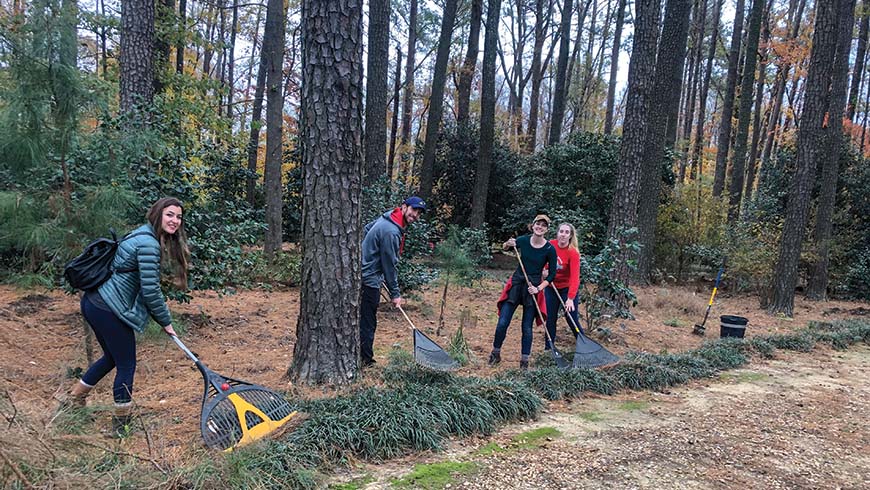
Andrea Smith, who volunteered at the event, wrote, "Imagine standing in the garden to find plants and trails covered in filthy flood muck of questionable origin and looking up at the trees to see a flood line well above human height. It's hard to fathom, even though I physically stood there myself. Despite what could lead to despair, picture being greeted by a team of yet hopeful, friendly faces offering words of fierce determination and gratitude to us, the group of JC Raulston Arboretum and NC State volunteers that arrived to contribute an afternoon of help in their ongoing battle for recovery. I'm still humbled by them. Whatever challenges our gardens may face in the future, may we share both joys and challenges, and strive to encourage the fighters and join the helpers."
